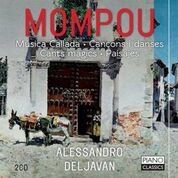The piano music of Federico Mompou (1893‐1987) holds a unique place in 20‐th century piano literature. The apparent simplicity of Mompou’s music with its affinity to naïve “folk” elements – popular songs and dances, children’s games, spells and incantations ‐ is deceptive: like Satie ‐ the composer with whom he is most often compared ‐ there is always a sense of a greater complexity hidden just below the surface. However Mompou himself was uninterested in analyzing his music, claiming, “ I don’t know where it comes from – that’s one of the secrets of art” and in describing his style as primitivista, he signalled a desire to return to first principles ‐ a “recommencement” as he described it. Although he spent many years in Paris and was close to the galaxy of composers living in that city in the 1920s– becoming more or less and an honorary member of les Six ‐ he remained virtually immune to outside influences.



